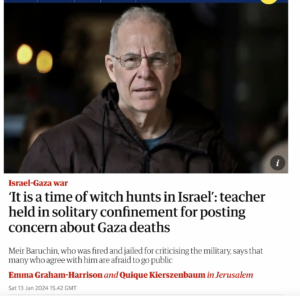Just a week after criticizing the entire Israeli media for emphasizing Israel’s pain following the October 7 Hamas attack and not emphasizing enough the Palestinian suffering in the Gaza Strip, journalists Emma Graham-Harrison and Quique Kierszenbaum have followed up with another worryingly skewed article published in The Guardian’s sister newspaper, The Observer.
Headlined, “‘It is a time of witch hunts in Israel’: teacher held in solitary confinement for posting concern about Gaza deaths,” the piece focuses primarily on Meir Baruchin, who, readers are told in the subheading, was “fired and jailed for criticising the military” and claims that “many who agree with him are afraid to go public.”
The piece explains that the “grey-haired, softly spoken history and civics teacher” was placed in solitary confinement in a Jerusalem jail in early November after he was charged with intent to commit treason over what Graham-Harrison and Kierszenbaum describe vaguely as a “series of Facebook posts he’d made, mourning the civilians killed in Gaza, criticising the Israeli military, and warning against wars of revenge.”

Indeed, just one message that Baruchin posted online on October 8 — as the scale of the unprovoked massacre of Israeli civilians was clear — is reprinted in the article:
‘Horrific images are pouring in from Gaza. Entire families were wiped out. I don’t usually upload pictures like this, but look what we do in revenge,’ said a message on 8 October, below a picture of the family of Abu Daqqa, killed in one of the first airstrikes on Gaza. ‘Anyone who thinks this is justified because of what happened yesterday, should unfriend themselves. I ask everyone else to do everything possible to stop this madness. Stop it now. Not later, Now!!!'”
What readers are not told, however, is about the other comments Baruchin allegedly posted online that dark day in October.
Among other things, Baruchin is said to have justified Hamas terrorists raping Israeli women and also accused the IDF of perpetrating sexual attacks against Palestinian women ever since the State of Israel was established.
Had Graham-Harrison and Kierszenbaum reprinted the alleged posts, the fact that Baruchin was initially arrested for incitement would have at least made some sense.
It is later reported that — despite what’s stated in the headline — Baruchin is technically no longer working as a teacher after making what they call “similar criticism at a less volatile time” that led to his sacking from a school in Rishon LeZion three years ago.
But again, the actual contents of Baruchin’s incendiary posts are glossed over: readers are not told that in January 2020 following a terrorist attack, he uploaded a photo of the Palestinian terrorist and “eulogized him and described his deeds as acts of desperation,” according to Adnan Zada, the Israel Police representative.
In another post written in the aftermath of a car-ramming, Baruchin allegedly said the attacker could not be called a “terrorist.”
Finally, the circumstances surrounding his job are incorrectly stated in the Observer piece, which states that Baruchin has an employment tribunal hearing this month because, under Israeli law, municipal authorities have “no right to fire a teacher whose performance has always been excellent.”
Going back to reports from three years ago, it is clear that Baruchin was not simply fired for expressing his personal opinions.
What actually happened was that Baruchin described the IDF as “murderers” and he was called into a meeting with the school principal Dr Sophie Ben Artzi, who told him his comments were not appropriate. “I asked him into my office and just said that I am not prepared for him to call IDF soldiers murderers. He said that he will call them whatever he wants and I responded with ‘meeting over’,” she explained about the incident.
Read More: Canceled: How Facebook, Instagram and Twitter Silence Israel Online
Yet, full details of the allegations that led to Baruchin’s arrest aren’t the only thing absent from this Observer feature.
The case of another teacher, Yael Ayalon, the head of a Tel Aviv high school, is also briefly touched upon, with readers told that she was summoned by authorities after sharing an article by Haaretz that claimed the Israeli media is hiding how Gazan civilians are being impacted by the war:
Her students rioted in the school after news of the post spread; she took her employers to a tribunal and was reinstated, but when she returned to school she was attacked again by students chanting ‘go home’. She declined to speak to the Observer.”
But in an ironic twist, it is Haaretz that went into the circumstances of the case, with sources telling the publication that Ayalon was summoned to the hearing “due to her problematic conduct, which also includes various administrative issues, and not due to her Facebook posting.”
Graham-Harrison and Kierszenbaum’s latest feature is a masterclass on how to spin the truth.
One can agree or disagree with Baruchin’s treatment by Israeli authorities but it is clear that Graham-Harrison and Kierszenbaum have told only half the story in an attempt to portray Israel as being in the grip of McCarthyism when it comes to criticism of its military and the current war against Hamas.
While Meir Baruchin may benefit from this bias, hopefully, some readers will Google his name and read the full story.
Liked this article? Follow HonestReporting on Twitter, Facebook, Instagram and TikTok to see even more posts and videos debunking news bias and smears, as well as other content explaining what’s really going on in Israel and the region.



